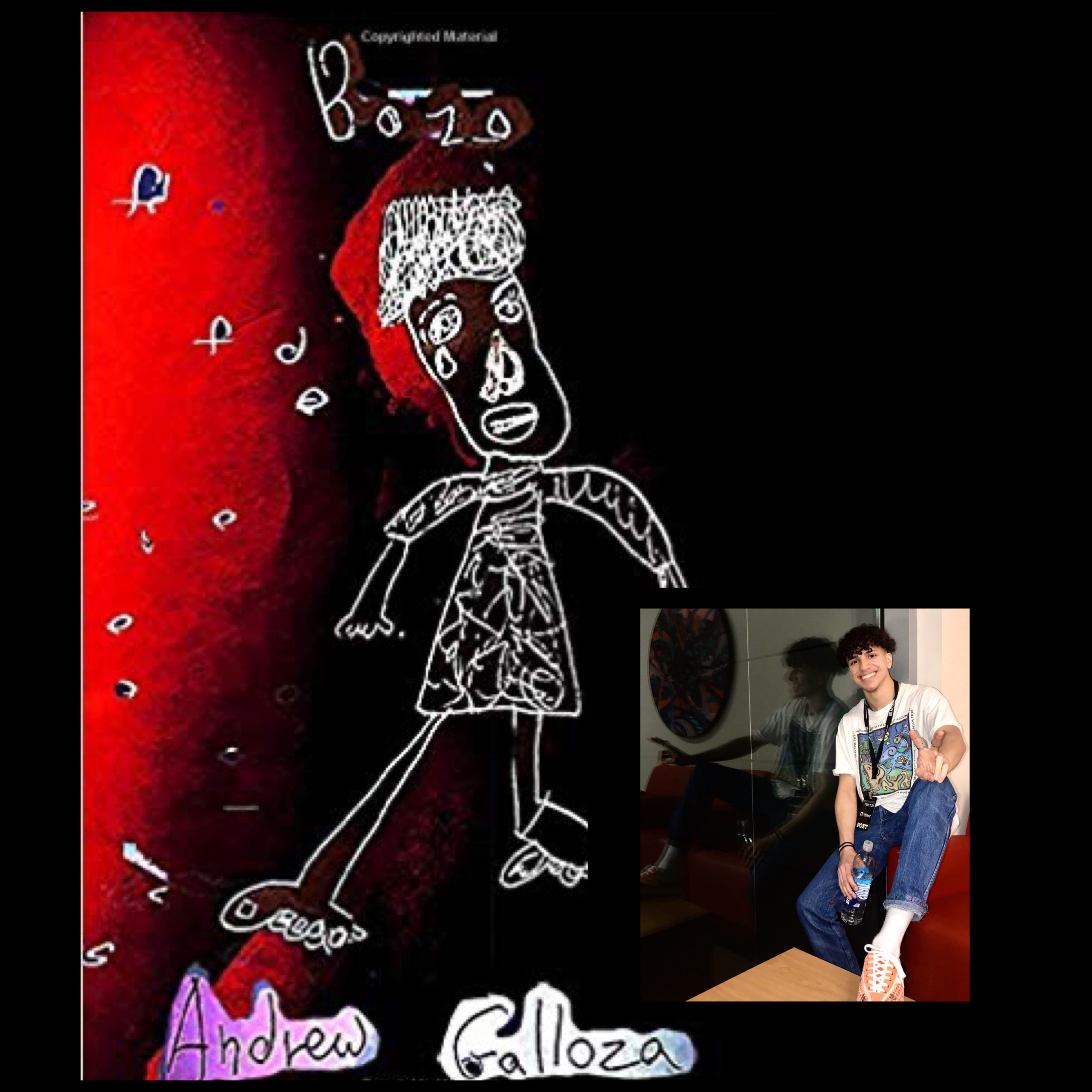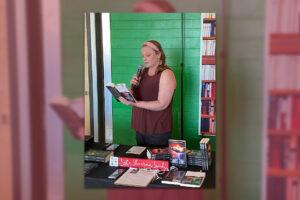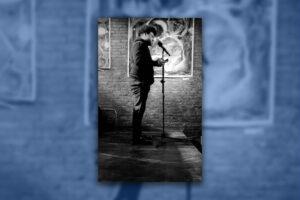By Le Selle Benjamin
On Oct. 16, 2019, I had the delightful opportunity to interview my friend, a poet, and artist spanning all genres and mediums! Andrew Galloza is a senior at the University at Albany and is the author of the recently published poetry collection, Bozo. Galloza has been honing his craft of writing raps, poetry, and music for over a decade, and continues to develop while mentoring other performers as the Programming Coordinator for the Phenomenal Voices performing arts group on the UAlbany Campus.
Le Selle Benjamin: So today I’m sitting with poet, spoken word performer and artist, Andrew Galloza! First of I would like to thank you for taking the time to sit and speak with me today.
Andrew Galloza: Thank you.
LB: My first question is, “When and how did you get your start in writing poetry?”
AG: My first rap I wrote when I was like four years old and I remember being mad scared that my pops would see it because I had the words “sipping beer with my friends” and I thought beer was like a curse word. So I was like dumb shook that my pops was gonna come in and read it. He read it and he didn’t even make a reaction to it, so I was like “aight”. But eventually that just snowballed. High school was just writing more raps and songs and then once I came into college I saw that Phenomenal Voices had a whole platform for artists to just go crazy! So I was just inspired by that and that, you know, transferred my writing from more raps into like more poetry styles. I would definitely say my freshman year of college and I just been keeping going at it.
LB: Okay and considering that you said you started off rapping when I asked you how’d you get your start in writing poetry, what’s the master title that you ascribe to? When you introduce yourself to someone do you say you’re a poet? Do you say you’re an author? Do you say you’re an artist? Do you say you’re a rapper?
AG: I would say artist or creative.
LB: And why is that? Is it because you like the overarching term or because you haven’t picked which is going to be your main?
AG: I like the idea of a Renaissance Man or just, you know, able to dabble in multiple things.
LB: Like a “jack of all trades”?
AG: Yeah. Um, a master of none and good at all. I try to master everything I try to get my hands at. So yea definitely.
LB: Alright so artist or creative you said?
AG: I’d say artist.
LB: I read “Bozo” and it seems to go back a lot to your community and your upbringing. So how do you feel like your upbringing and your community has influenced you overall as a writer?
AG: As a writer? Definitely coming from the Bronx… and especially in a city environment, you can’t really look at somebody for too long or there’ll be a problem. So I guess not really looking at people but knowing people was there.
LB: Like observing them without really looking at them.
AG: Yeah. And I ended up, I guess observing more of the outside scenery and then of course people kind of fill in the blanks. So definitely just coming from that environment and coming from a Puerto Rican household we’re loud, exuberant personalities. So, it’s just, that definitely influenced me because I grew up quiet.
LB: Oh wow. I wouldn’t know that. Having experienced your poetry I wouldn’t know that because you’re very bold in the way you perform.
AG: For real. I don’t even know how I came out of my shell. But like I was mad shy growing up. Awkward, anti-social, socially awkward and I didn’t know how to navigate conversations but just being quiet and observant, you know, I was able to intake everything.
LB: Good to know. My first time experiencing your poetry was at a Phenomenal Voices show in 2017. How does your process for creating a spoken word piece differ from the process of creating a poem say for your collection?
AG: Interesting. So, for a spoken word piece, definitely the performance is like vital. Seeing not only if the words are going to be translated to a stage in which people ain’t gonna be reading it, they’re gonna be hearing it. So in that process, the thing that would change is like how impactful is each line rather than, is this like a full-fledged out thought that might look good on a piece of paper.
LB: [Poems written for a collection] don’t transfer [to the stage] well?
AG: Yeah. So just that difference and seeing or hearing how it sounds as I say it.
LB: What I think is interesting with spoken word poetry as opposed to written poetry is if you’re reading written poetry, you have to imagine how the author wanted it to sound as opposed to when you’re doing a piece, you—as the performer—decide how it’s translated.
AG: And then if you want to stage, you could do like hand motions and kind of, you know, create the whole picture.
LB: So many of the poems and your collection Bozo seem very personal and they’re very relatable. It’s like you almost wrote them as a form of therapy or like your own self-expression. Are there any problems in Bozo that you wrote with the intention of touching someone else or that you wrote in response to someone else’s experience?
AG: There was one called ‘Ayo Pedro’ that was about, I’m waiting for the bus and there’s a crackhead lady across the street and she’s kind of like bugging out, just talking to herself and all types of stuff. I guess I wrote that in response to just… like even in my family… having family members that are like in shelters because they was, you know, doing what they was doing and just everyday seeing people picking stuff off the ground seeing if it was something white or money or something. So definitely in response to that I wrote that.
There’s another one called ‘Ebonics’. I don’t know how to describe that one… that was the response to a time I was just hanging out with friends. One of my friends goes “Oh what if the moon is a telescope in the sky?” And I was like, “What?” So, I wrote that in that poem. I guess those are two examples.
LB: I feel like the one thing I really enjoy about reading Bozo is… I’m also from New York city. So certain things you said in the poems, I understand. Like when you’re talking about the train, I think my favorite poem that I read was the one when you, when you saw someone you fell in love with on the train.
AG: Oh yeah!
LB: I remember when I finished reading, I got up and told my friends, “anybody else ride the MTA and then has that feeling like, wow, I’m in love with this person. I’ll never see them again!” So, I feel like Bozo was such a cool collection because it’s relatable and anybody that’s from New York City or even someone that’s not from New York City. I was also discussing with one of my friends who’s from, Connecticut I believe.
AG: Wow.
LB: It’s like, if you understand the feeling of New York, the energy of it, your poetry is so relatable. It’s like a Testament to it. It also reminds me kind of another female poet I read, that’s also of Hispanic descent, Elizabeth Acevedo. I was reading her book “The Poet X” last semester. It was interesting to see. The main character was a poet and she was writing stories that her mom burned. I feel like if her mom didn’t burn the book, maybe this is something like the book might have been. That’s one of my favorite works and this is one of my favorite collections right now.
AG: You know it’s funny even when reading that book, I thought it was like one of the most relatable books I’ve ever had my hands on.
LB: Exactly. And it’s good as artists of color to be able to read other artists of color cause sometimes the poetry you read in school or the poetry you’re taught growing up isn’t necessarily relatable to you. Sometimes the language isn’t familiar. But yeah. So thank you for that, that poem especially. It was a great conversation starter for me and my friends.
AG: That’s fire.
LB: You repeated the definition of Physiognomy?
AG: Physiognomy that’s like you look at a person’s face and kind of study their historical backgrounds.
LB: Yeah. Yeah obviously repetition is important in literary work. Why did you feel the need to repeat it at different parts of the collection? It wasn’t just there once, it was every few-
AG: Repeat what?
LB: The physical definition. I saw it once and I was like “okay cool. I get why” and then after I turned a few more pages and again it was there. Why did you feel like it was necessary to put it in?
AG: Could you like… you’re talking about physiognomy. That one word specifically?
LB: Yeah. I think you had it in the book more than once. The definition for it. How do you feel it related to your entire collection?
AG: To the entire collection? I guess assumptions people would make off of your appearance or how you look or facial features and create a whole background of who you are. So I guess in relation to the collection of poems, it was just like, okay, this is how I really am. I might appear this way by how you view me, but this is how I really am based on my thoughts and just perspective.
LB: I think it’s interesting that you explained it like that cause then it adds a new context of the story in the way that the poems are essentially your thoughts—they’re what you see you and what you grew up with. But the definition in the book is someone else looking at you. So, it’s kind of that duality of what you see versus what I really am. So, okay that definitely shapes it.
AG: Great observation.
LB: Thank you. This is my last question. It might be hard because it’s kind of like asking your parents to choose their favorite child, but which poems in Bozo are you the most fond of today?
AG: In Bozo specially two come to mind. The last one, ‘Light to Confusion’. Cause that was like a breakthrough for me in terms of just coming to terms with like my parental background, how they raised me and how they would interact with each other and how that kinda affect me and also ‘Ebonics’.
LB: Yeah, I really like that one too.
AG: Word, I read it all the time and I’m just like, “What was I thinking when I wrote this?” That one stands out.
LB: It’s interesting that you’re able to go back and read your own work like “this is some pensive stuff!” Okay so ‘Ebonics’ and the last one. Are there any projects that you’re working on at the moment whether it’s performance pieces, poetry collections, visual work—Because like you said you consider yourself a renaissance man so is there anything that you’re working on at the moment?
AG: Definitely a performance from Phenomenal Voices… working on that. I’m trying to branch out. My goal has always been to be a musical artist and to drop music; so I’m working on like my first collection of songs that hopefully will be released soon but I gotta get off my behind
LB: *laughs* That’s a lot of active work though because you’re also a student. It’s interesting to see the drive of someone juggling being a student, writing a poetry collection, and doing a music collection. It’s admirable, really, to say the least.
AG: Thank you.
LB: Is there anything else you have coming up with regards to Andrew Gallazo? Anything we should keep a look out for? You said that your Phenomenal Voices show is coming up. Do you guys have an idea of when that will be?
AG: We’re thinking early December.
LB: Early December… okay.
AG: And just graduating! Graduating class of 2020.
LB: Aye!
AG: Going to the real world, so they say.
LB: Welcome to the true stomping ground. How can people follow your poetry and keep up with what you’re working on? Any platforms or websites or anything like that?
AG: Yeah. They can follow me at andrewthespirit on Instagram and I hope to have a website up and running soon.
LB: Definitely. Well definitely keep in touch so that when that’s up and running we can add your info to the Albany Poets/NYWCompendium sight to establish more visibility. Once again, thank you so much for taking the time to sit with me today and I look forward to experiencing more from you.
AG: Thank you.
Andrew Galloza is a raw example of inherent skill that manifests in passion and purpose. Having had the opportunity to sit down with the artist, whose work I have been in awe of since my first Phenomenal Voices performance, was truly an impactful experience. I look forward to the release of Galloza’s musical compositions in the near future, and I eagerly await his performance in the Phenomenal Voices fall showcase later this year.
Keep an eye out for the review of that event right here on our website!





